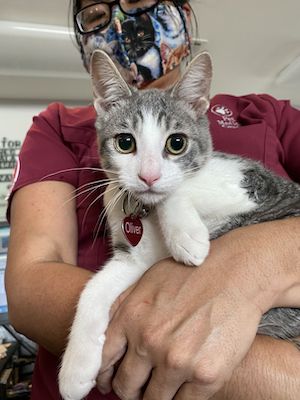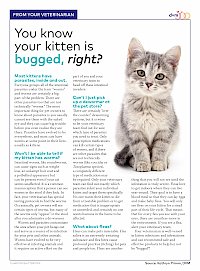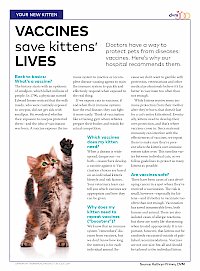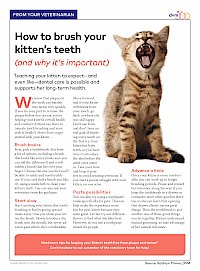New Kitten Information
Do you have a new addition to your family?
Getting a new kitten (or even an adult animal) is a big responsibility. Here is a list of things to do to so that your new pet can start a happy and healthy life:
- Health Check – the first thing your new kitten needs is a check up by your veterinarian. Your vet will recommend testing, vaccination, and other things, as well as identify problems. Checking a new kitten for congenital defects as well as infectious diseases, upper respiratory infections, and other problems is important so that problems can be identified and treated early.
- Vaccinations – these should go along with your first health check. Kittens should start vaccines at 7-8 weeks of age and continue vaccinations 3-4 weeks apart until 16 weeks of age. These vaccinations prevent potentially fatal or life-long diseases, so DON’T PUT THEM OFF!
- Feline Leukemia / Feline Aids Testing – Feline leukemia and feline aids are viral diseases which are passed between cats. All cats should be tested for these diseases, and depending on exposure, kittens may need to be tested more than once. While these diseases are not necessarily a death sentence, if your cat has them, it means some careful health monitoring as well as strict quarantine from other cats. These diseases often shorten cat’s lives, and sometimes cause severe disease even early on.
- Fecal Testing – almost all kittens are born with worms. Other parasites can also be picked up in the environment. Over the counter dewormers only kill a couple of these parasites, which can be fatal in kittens.
- Deworming – deworming should begin at 2 weeks of age, then continue every two weeks until your veterinarian begins your pet on a monthly heartworm preventative. Some of these worms can be fatal to young animals, as well as transmissible to people.
- Flea & Tick Control – here in Texas, external parasites are a big deal! Fleas and ticks are prevalent, and can show up even in indoor animals. Fleas usually get really bad at the beginning and end of summer, so the best thing to do is keep your pet on a year round control program. That way you spend a little money each month to control these parasites, rather than having to spend a lot of money each spring and summer trying to get a huge infestation under control. The safest and most effective flea control products are prescription products that you get from your veterinarian. Talk to your vet about the best type of flea control for your pet.
- Nutrition – good nutrition is important in kittens just as in children. Starting them off right sets the stage for a long healthy life. All kittens should be fed a high quality kitten food for at least the first 6 months.
- Heartworm Preventative – yes, cats need heartworm preventative as well! Your veterinarian can recommend a good time to begin monthly heartworm preventative (probably before 4 months of age). You will probably only get 1 or 2 doses at a time until your kitten reaches its adult weight. Heartworm preventative should be given every month year round to prevent heartworm, a potentially fatal disease which in the cat has no treatment.
- Spay / Neuter – spaying and neutering not only prevents pet overpopulation, but also gives your cat a longer, healthier life by preventing many cancers and infections. Have your pet fixed by around 6 months of age. A spayed or neutered pet lives a longer, happier life. In addition, neutering male cats almost always prevents the onset of spraying if done at this age. Spaying your female cat prevents her from going into heat. A female cat in heat cries and yowls constantly, and continue to go into heat every two weeks until they get pregnant. Not a fun thing to deal with!
- Housetraining – this is a critical part of making your pet a part of your life and a member of the household. Luckily cats are usually very easy to housetrain. They like a place to dig that is covered up. If you have more than one floor, have a litterbox on each floor. Keep the litterbox clean so that your cat will not try to find another place to use as their bathroom.
- Identification – permanent identification is a way to safeguard your pet if they ever get loose. A microchip is a small chip implanted under the skin. It is placed just like a vaccination, although the needle is bigger. It holds a number, so that if your pet shows up at a shelter, they can scan it, call the company, and get your information from the microchip company. You have to update your information each time you move.
- Pet Insurance – no matter how healthy your pet is now, injuries or illnesses can bring about unexpected costs. Pet insurance is a great option to ensure you can do everything possible to keep your pet healthy. There are many different types of pet insurance, so research to see what works best for you and your pet. The best time to start insurance is when they are young.
This is a brief description of some of the really important things you need to think about with your new pet. To get more information on each of these topics, ask your veterinarian, or your veterinary clinic staff. They will be glad to help you out. Finally – If you have any problems – see your veterinarian right away. Watch your pet closely for signs of sickness and address it early!
Books for new kitten owners:
- Decoding your Cat by the American College of Veterinary Behaviorists [URL]
-
Kitten Milestones [PDF]
-
Litter Training Kitten [PDF]
Clicke the link below to view the articles.
Cookies on this website are used to both support the function and performance of the site, and also for marketing purposes, including personalizing content and tailoring advertising to your interests. To manage marketing cookies on this website, please select the button that indicates your preferences. More information can be found in our privacy policy here.










